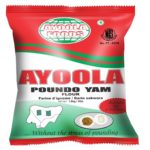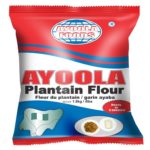By Gbenga Osinaike
You can’t encounter food items from the stable of Ayoola Foods and remain the same. The quality, the packaging and the alluring work environment of the organization located in Gemade Estate, Egbeda, Lagos attest to the company’s penchant for excellence.
Unlike many Nigerian branded food items that were first sold in Nigeria before they were moved to the global market, Ayoola foods’ brands were well entrenched in the global market before coming home.
The products from the stable of the organization including yam flour (poundo yam), Plantain flour, Rice flour, casava flour and a host of other packaged food items were first tested abroad.
The Managing Director of Ayoola Foods, Mr. Segun Olaye who is the brain behind the products had his eyes set on the global market. He believed the packaged food items were better sold abroad. And selling abroad meant keeping in mind global standard of hygiene and quality.
So, the organisation was incorporated in September, 1991 with the initial focus of exporting Nigerian food items to meet the yearning desire of Nigerians and Africans in the Diaspora for African Foods.
But in 2004 it shifted its focus to the Nigerian market with the introduction and aggressive promotion of Ayoola Poundo Yam, the flagship product of the company which today is the market leader among other brands in the country.
Mr. Olaye later saw the reason and the need to patronize the home market. He also saw the need to provide opportunities for young Nigerian graduates who roam the streets without job. “That was our driving force. We later saw the need to contribute to the economy of Nigeria. Though it has been challenging we have had to play along.” He said.
To further give many Nigerians the opportunity to benefit from its products, the organization has continued to increase its presence in Nigerian market and has also had to enhance the quality of its products. The plantain flour for instance has been discovered to be a great food item for all. It is made from unripe plantain.
Olaye said in an interview, “Unripe plantain has so many health benefits, which is why we introduced the plantain flour. You see, Nigerians are now careful of what they eat because as the saying goes, you are what you eat. Plantain flour is a very good food for any age group, demography, gender, body shape. We use 100 per cent unripe plantain for the product, that is, when it is still green, because that’s the stage when plantain has so many vitamins.”
He stated further that “It contains vitamins B6, C, A. Unripe plantain helps in strengthening the bones because of the high calcium content, helps in enhancing good vision, helps in boosting the immune system and it enhances sexual performance, that is, it boosts libido. You can also use it to reduce fat tummy, it helps in losing weight. It also has carbohydrate. These are facts”
He stressed that the organization does not use additive for its plantain flour and indeed all its products “it is processed when it’s still green and the process is just drying. That is why the quality is super. We can’t compromise the quality of what we produce.”
Apart from Plantain flour, its star product, poundo yam has over the years enjoyed patronage from Nigerians in diaspora who want to enjoy the benefit of eating pounded yam without going through the stress of pounding. The product has made life easy for housewives and many who would not like to go through the time wasting process of pounding.
An engineer by training, Olaye said the beginning was a bit rough noting that many of his colleagues thought he was out of his mind for dumping engineering for the food business. He however noted that the reality of Nigeria’s economy is that there are no jobs anywhere. “People should begin to look inward and create job rather than waiting on government to give them jobs. It is better to start small and grow than to want to start big. There is a need for young people to be focused and not be in a hurry to succeed. But then government also has to come in to support genuine business proposals. The banks too have to be encouraged to support what young people are doing.”
Before 2004 he said, “You could never get our products in the Nigerian market. We were packing virtually every Nigerian food and exporting to the United Kingdom, the United States, Canada and so on. We were selling to the big stores in those countries.”
Though exporting was a good way of earning foreign exchange for Nigeria, he recalled that the need to impact the Nigeria market and also satisfy customers in Nigeria informed the decision to start selling in Nigeria. “One elderly Igbo woman returned to Nigeria from Houston, US. But while she was there, she used to eat our fufu (cassava flour), which has no smell like the one people consume here.
“She came to visit her family in Nigeria and she told them to buy our fufu for her. The children went everywhere but couldn’t find it. The woman was surprised that even in the US, she used to get the product. She then told her people in Houston to send our fufu wrap to Nigeria so she could show her children. She gave the wrap to the children, still they could not get it. One day, as the children went to work, the woman took a cab and traced our office address. I was in the office that day. When I received her in my office, she brought out the fufu wrap and told how she used to eat our fufu in Houston but couldn’t get it in Nigeria. She asked why it was so. I told her we weren’t selling any of our products here, but for export.
She wondered, ‘How could you do that?’ “That’s when it occurred to me that we should start selling in the country, after 10 years of operation. At that time, though, I was already thinking of rounding off the food export business and retire. But somehow, that woman changed my perspective and that’s how I decided to sell here. At that time, I always thought the local market wouldn’t accept the product, but when we introduced it, they loved it.”
As it is, the products from the Ayoola stable is growing by the day. More people are getting to like them. “We are positive that the products will keep growing. The economy is challenging but then we have to keep hoping that it would be better. The potentials in Nigeria are too enormous. But government has a greater role to play in helping businesses especially manufacturing.”




